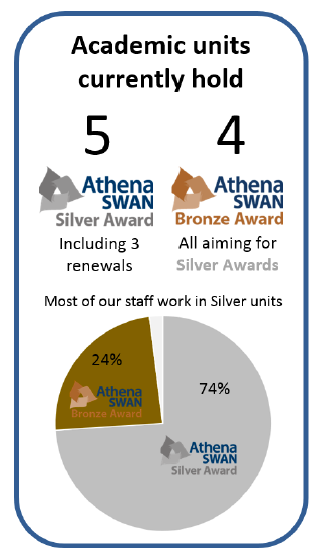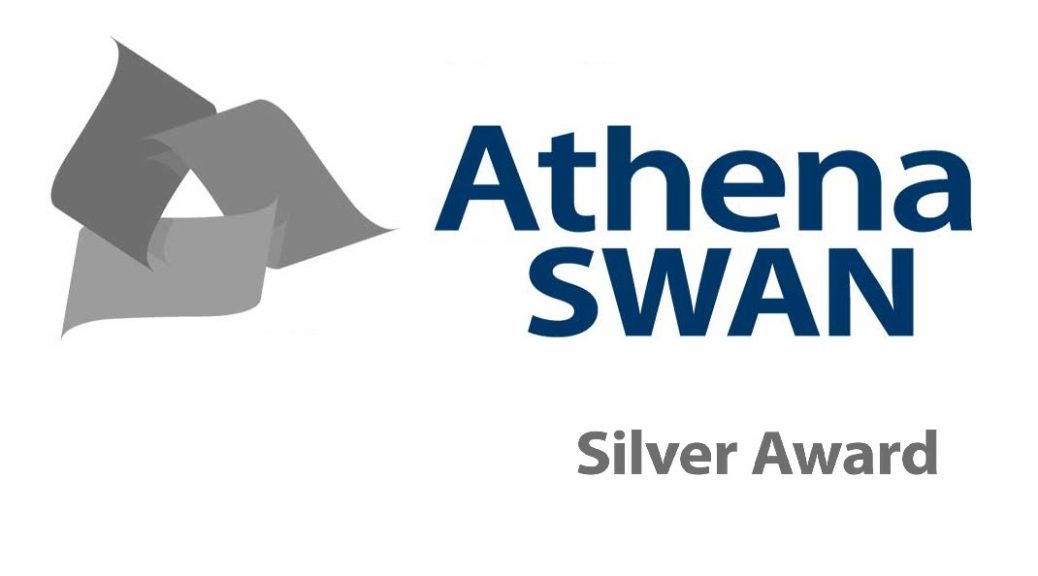We submitted our first application for a Faculty Silver Athena SWAN Award in May 2018. All our eligible schools and institutes had already engaged with Athena SWAN, and nearly three-quarters of our academic and professional staff were in units already holding Silver awards. However, rather than continue to make lots of separate awards, we decided to change our approach and move to making a single Faculty application. In this blog, we explore why we made this decision, what the benefits (and costs) are, and some reflections on the process. We welcome any comments or questions, and are more than happy to talk to any other Athena SWAN and EDI teams already taking this approach, or thinking of doing so.
Why make a Faculty Athena SWAN application?
 This was the question we asked ourselves over two years ago now – should we keep making 10 or more individual Athena SWAN applications, or just make a single Faculty application? We hold 5 Bronze and 4 Silver departmental awards: with around 75% of our staff in Silver departments, was it time to make a Faculty Silver application?
This was the question we asked ourselves over two years ago now – should we keep making 10 or more individual Athena SWAN applications, or just make a single Faculty application? We hold 5 Bronze and 4 Silver departmental awards: with around 75% of our staff in Silver departments, was it time to make a Faculty Silver application?
It was a big question, but in the end, one that had a very easy answer.
We discussed the pros and cons widely: centrally with the VC and Dean of Diversity, internally with our Faculty Executive and EDI Committees; and also sought advice externally from other universities, and of course, the ECU. What became clear to us during all these discussions was that the potential benefits far outweighed the potential costs, and that making a single Faculty application was the right thing for us to be doing.
The five most compelling reasons for change were:
- We could be fully inclusive of all our staff and students. Our Faculty, like many others, is a complex place, and not all academic and professional staff sit in units that are eligible to make applications for Athena SWAN. We also have a satellite campus in Malaysia, NUMed, with staff and students moving between the two. We wanted to include all our students, wherever they are in the world, in our EDI activities.
- We could more easily develop a cohesive and ambitious Faculty-wide EDI vision and strategy, one that could increase visible leadership and engagement in our staff and students, and leave a lasting legacy.
- We could tackle those bigger issues, many which lie outside the immediate control of each unit. I’m sure anyone who has attempted to change an HR form or a central policy knows what we’re talking about here. By joining together, we have more clout and also more resources for achieving change.
- We could pool all our data to identify issues that can otherwise remain invisible in larger datasets. We have 1800 staff and 5500 students, meaning that we can explore intersectionality for the first time. Datasets can also be too small to be conclusively informative at departmental level, and we wanted to see how far we had come as a Faculty.
- We could free-up time from making multiple (and often overlapping) applications and actions plans. We could spend more time exchanging and embedding good practices and addressing joint areas of concern, and more readily expand our EDI work outside of gender equality.
Of course we also had to consider the potential costs. We were concerned that a Faculty award could reduce engagement from staff and students, and that units might lose momentum with the action plan held at Faculty level. We decided to address this by each department continuing to hold a local action plan that not only supports our joint Faculty ambition, but also identifies and addresses local cultural and discipline-specific issues based on their own data. We are also trying to make sure that staff and students are all increasingly aware of the agenda and the part they can play in creating inclusive work and study spaces.
And of course, being a medical faculty, there were concerns about us losing our Silver Athena SWAN status, and the immediate impact that could have on funding success. Not holding a Silver award would also potentially mean that the institution could not apply for its Silver renewal in April 2019. This is where talking to ECU really helped us to identify a workable solution. They listened to what we had to say and, acknowledging the benefits and the potential challenges and risks, have offered us two bites of the cherry. If we don’t get our Faculty Silver award at first attempt, we can keep our current departmental awards and apply again next April. Fingers crossed we don’t have to do that given all the work involved, but this arrangement encouraged us to take the plunge.
At the end of the application process, whatever the result on October 19th, we feel we have made the right decision. We may not have got everything right yet, and we acknowledge that this is just one step in our journey, but we are certainly moving in the right direction towards becoming fully inclusive.
Faculty EDI Team, FMS.Diversity@ncl.ac.uk

